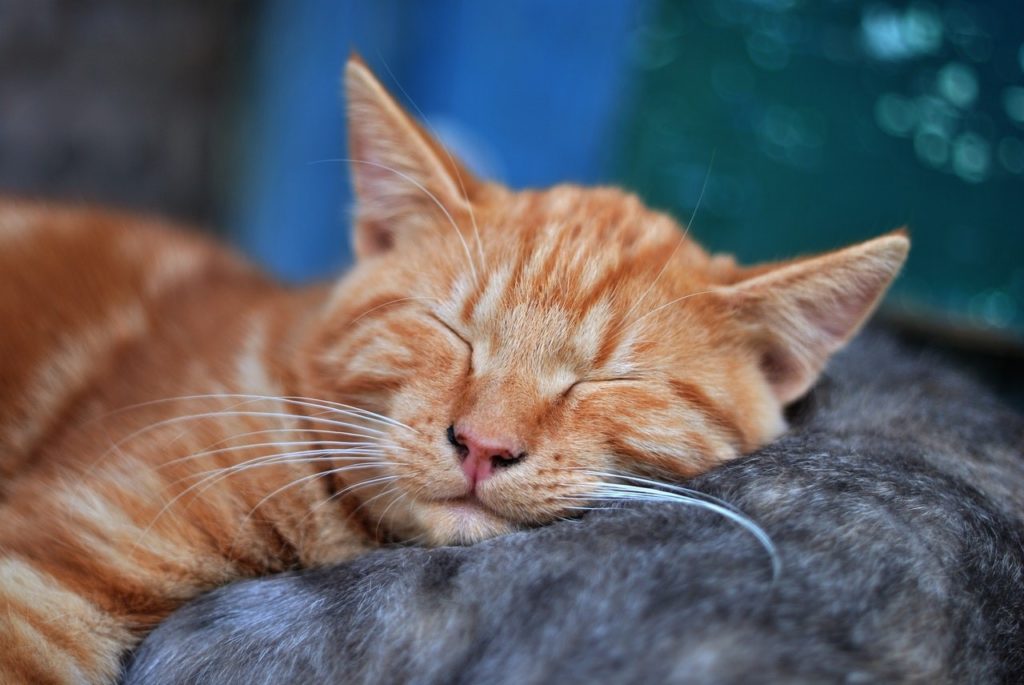
I learned this today. Cats sleep as much as they do to conserve energy. Something we should probably learn from. Not that it’s today’s topic, but humans are the only animals that intentionally restrict their sleep.
Cats sleep between 16 and 20 hours a day. However, not all of that sleep is deep sleep and they tend to nap a lot.
The main reason that cats sleep for so long is to preserve energy in order to be able to hunt. Domestic house cats are obviously descended from wild cats, and they still have the same ingrained instincts. In the wild, lions and other big cats also sleep for about 16 to 20 hours.
Cats are hunters and they have to be fast to catch their food. Bursts of speed require energy and if cats didn’t sleep a lot, they wouldn’t be able to find those bursts of energy. Domestic cats obviously don’t need to hunt, but the 9000 years or so that cats have been domesticated isn’t enough to eradicate the 6 million years or so of evolution that has made them what they are.
Another reason is to stay cool. Cats evolved to live in hot climates and sleeping is a way of staying cool. They sleep through the day and are active at night, when it is cooler.
A third reason that cats sleep so much is basically because they can. Lions and tigers are apex predators, which means that nothing preys on them. Well, if we discount humans, that is. Animals that are at the top of the food chain have the luxury of being able to sleep for as long as they want. They have no fear that something will attack them while they are sleeping. Domestic cats are not apex predators. In the house, domestic cats sleep for a long time because they are safe. In the wild, feral cats cannot sleep as long as indoor cats because they are sometimes preyed upon by animals like coyotes. They sleep in small holes or up in trees, which is why your house cat likes to sleep up on high and in boxes. Because of this, cats have evolved the sleep patterns that they have.
Cats may appear to be sleeping for 16 hours a day, but they are not sleeping in the way that we sleep. About one fourth of the time that they sleep is REM sleep. This is the deep sleep time when the brain is recharging and fixing itself. The other three quarters of the time, they are in a shallow rest called “slow-wave” sleep. They are dozing, but all of their senses are still alert. If your cat is asleep and their ears move at a sound or their noses twitch at a smell, then they are in this slow-wave sleep. They are able to come fully alert from this state in seconds. If a sleeping cat fell off the sofa, they would be awake and have righted themselves before they hit the ground.
They switch between the two states spending about five minutes in REM sleep and then 15 minutes in slow-wave sleep. So, you could technically say that cats sleep for about 4 hours a day and doze for the other 12 hours.
Cats are also crepuscular predators. That means they are basically awake at dawn and dusk. This makes sense because it is when their prey is awake, and it makes the most use of their ability to see in the dark.
Different kinds of animals sleep for different amounts of time. In general, predators (carnivores) tend to sleep more than prey (herbivores), for obvious reasons. Prey animals tend to sleep for short periods of time in order to keep alert. Birds sleep with one side of their brain at a time, and they can actually control how much of their brain is asleep by how much they close their eye. However, some animals that are not predators can get by sleeping a long time because of where they sleep. Bats sleep for a long time because it is generally impossible for predators to get to them. Brown bats sleep for about 20 hours a day. Some monkeys also sleep for a long time because they are safe in the trees.
On the other hand, there are predators that don’t sleep very deeply. Crocodiles tend to sleep with one side of their brain at a time in order to stay alert for approaching prey. Dolphins also sleep with one side of their brain at a time because they need to keep breathing while they are asleep.
So, cats sleep for a long time because it is how they have evolved. They do it to recharge their batteries, stay cool, and most big cats do it because they are safe. Domestic cats are also safe from danger and can sleep a lot. However, only about 25% of the time that your cat looks asleep is actually deep sleep. The rest are just cat naps. And this is what I learned today.
Sources:
https://www.hillspet.com/cat-care/behavior-appearance/why-cats-sleep-so-much
https://www.britannica.com/story/why-do-cats-sleep-so-much
https://www.petmd.com/cat/behavior/evr_ct_why_do_cats_sleep_so_much
https://en.wikipedia.org/wiki/Cat
https://www.smithsonianmag.com/science-nature/the-secret-lives-of-feral-cats-179790776/

